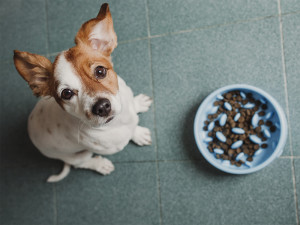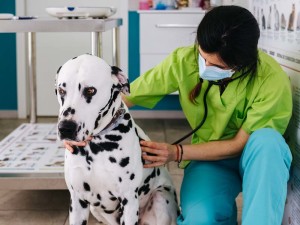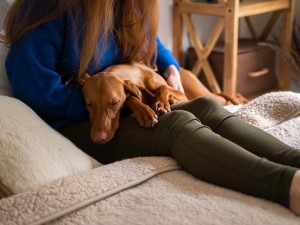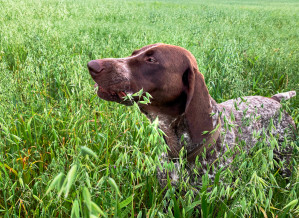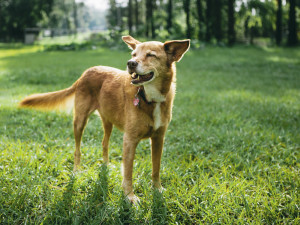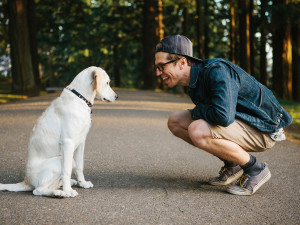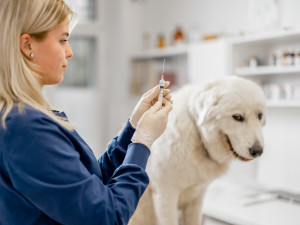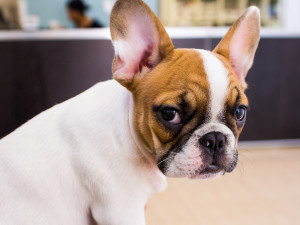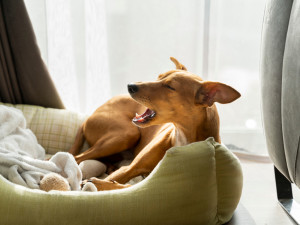Can Dogs Get Hiccups? Why It Happens and What to Do
In addition to being adorable, it’s nothing to worry about.
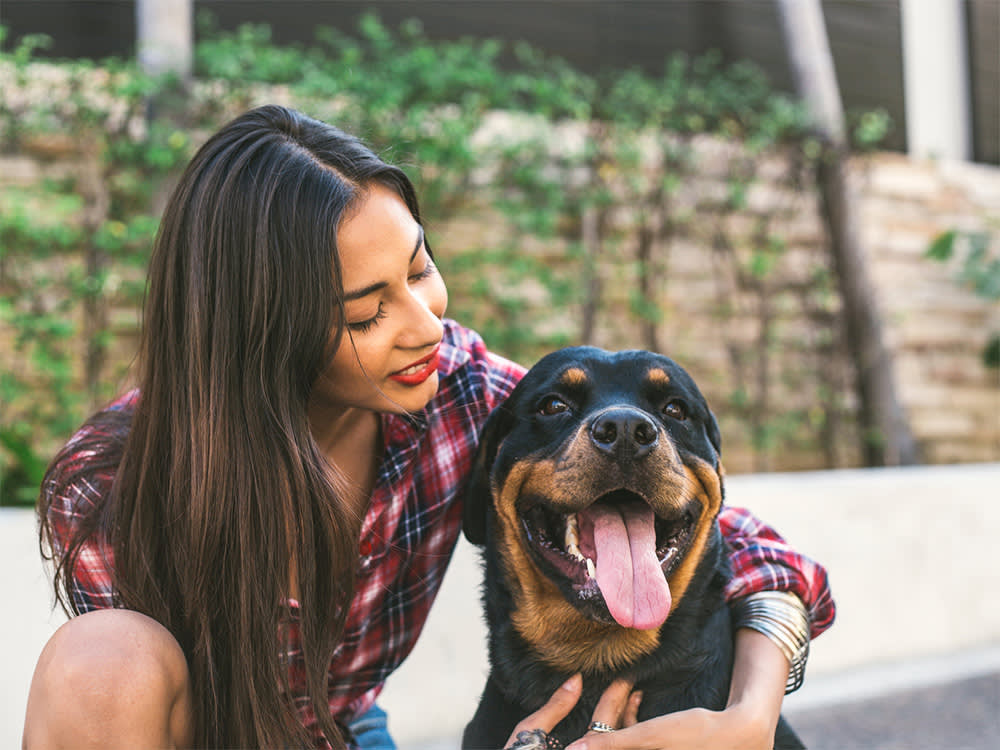
Share Article
In This Article:
Can Dogs Get Hiccups? Causes of Dog Hiccups Are Dog Hiccups Dangerous? When to Contact Your Veterinarian Home Remedies to Stop Dog Hiccups Frequently Asked Questions
Yes, dogs can get hiccups that may cause mild spasms or gagging for brief periods. Hiccups in dogs are typically triggered by factors like eating too fast, stress, excitement, or trauma. Fortunately, hiccups in dogs usually resolve on their own.
Can dogs get hiccups?
Just like people, dogs can get hiccups. Hiccups occur in dogs of all ages, but puppies seem to be more prone to them. No one seems to know why, though. Theories include increased swallowing of air with excitement (and when isn’t a puppy excited?), overeating, and rapid growth causing nerves to stretch. No matter the cause, puppy hiccups are pretty darn cute, even though they can be annoying.

Causes of dog hiccups
In a hiccup, some of the rib muscles and the diaphragm, which is the big muscle that separates the belly from the chest, contract suddenly and involuntarily. The diaphragm does most of the work of breathing, so a sharp contraction that quickly changes airflow is bound to cause a little sound.
Hiccups are a reflex action triggered by irritation or stimulation of one of the nerves in the hiccup pathway. The anatomy can get a little complex, but basically there are nerves running from the stomach and diaphragm to the spinal cord, then to the brain. The signals from these nerves are processed in the brain, then sent back down to nerves controlling the vocal cords and diaphragm.
A problem anywhere along this pathway can cause hiccups, but the most common cause is thought to be stretching of the stomach. When a hiccup is triggered, the diaphragm tightens and the vocal cords slam shut, meaning that the sudden inhalation is cut off with a sharp “hup.”
Are dog hiccups dangerous?
In general, hiccups in dogs are bothersome, but not worrisome. Hiccups usually go away on their own within an hour or two. Puppies will have hiccups more frequently, but usually grow out of regular episodes once they reach a year of age.
Older dogs can have the hiccups too, but this isn’t a concern unless they are intractable (lasting more than a couple of days) or occurring very frequently. As long as the hiccups resolve on their own and don’t happen too frequently, they shouldn’t be a big worry.
Can dogs die from hiccups?
Hiccups by themselves are not a life-threatening problem. Dogs should not die from hiccups. The longest known episode of hiccups in a person lasted 68 yearsopens in new tab and did not result in his death. In fact, his hiccups mysteriously stopped a few months before he passed away. There are no similar records kept for dogs, but there have been no reports of dogs dying from hiccups.
That’s not to say that hiccups can’t indicate a problem though. If you’re concerned that your dog’s hiccups aren’t resolving like normal, you should see your vet for a check-up to make sure there are no underlying issues.
When to contact your veterinarian
You should contact your veterinarian if your dog’s hiccups aren’t going away on their own or if they seem to be linked to any other problems. Watch out for hiccups that last more than a couple of days or accompany other symptoms like vomiting, loss of appetite, or trouble breathing. It’s also a good idea to get your dog checked out if you’re not certain that what you’re hearing and seeing is a hiccup.
Other problems that look like hiccups
A few other conditions can possibly look like hiccups, or hiccups can sometimes have a more nefarious cause. Some conditions that can look like hiccups include the following:
Reverse sneezing: Caused by irritation in the back of the throat, reverse sneezes have a similar rhythmic motion to hiccups but are usually louder and more dramatic. They’re also usually benign.
Reflux esophagitis: Similar to heartburn in humans, the lower part of a dog’s esophagus can be irritated by acid from the stomach, causing hard swallowing, coughing, and head bobbing that can look like hiccups.
Distemper encephalitis: Practically nonexistent in vaccinated dogs, distemper can cause neurological issues that include rhythmic muscle twitching.
Myoclonic seizures: Seizures can show up in strange ways, and one of the weirder ones is intermittent rhythmic muscle twitching.
Hiccups caused by underlying conditions
In addition to the sometimes-scary conditions that imitate hiccups, hiccups can be triggered by medical problems as well.
A tumor anywhere along the nerve pathway controlling hiccups can set off episodes.
A hernia that allows the contents of the abdomen into the chest cavity can irritate the nerves controlling the diaphragm and result in hiccups.
Gastrointestinal disorders may affect the emptying of the stomach and the nerve signals from the stomach to the brain, triggering episodes of hiccups.
Any trauma or injury to the neck or chest could affect the nerves in the hiccup pathway and cause hiccups.
These are more serious issues that can be found by your veterinarian if your dog has intractable hiccups. Fortunately, these are very uncommon causes of hiccups in dogs.
Home remedies to stop dog hiccups
There’s no surefire way to stop or prevent hiccups in dogs. Like most recommendations for stopping hiccups in people, your mileage may vary with any method you try. Some common suggestions include:
Modifying eating habits
Get your pup to eat more slowly by spreading food on a sheet pan or using a slow-feed dog bowl. This can reduce air swallowing and limit stretching of the stomach. Smaller, more frequent meals can also be tried to see if they help.
Changing position
If a dog has developed hiccups, you can try putting them onto their back and rolling them side-to-side to help the hiccups resolve. Even if this doesn’t work, your dog will probably appreciate the extra attention.
Keeping calm
If your dog’s hiccups seem to be related to stress or excitement, teaching them calming cues can be helpful. Avoiding potential stimuli is great, but not always possible. It’s better to train your dog to react more appropriately to situations, which may improve their (and your) quality of life in general in addition to helping to prevent hiccups.
Hiccups are a perfectly normal and expected part of your dog’s life. While there are some bad things that can cause intractable hiccups, the overwhelming majority of these events are benign. So, feel free to take some cute videos of your puppy’s hiccups while you can.
FAQs (people also ask):
Can dogs get hiccups from being scared?
Being scared by itself shouldn’t trigger hiccups, but many dogs may bark, breathe more deeply, or pant when nervous. These changes to breathing may lead to increased swallowing of air, which could trigger hiccups.
Can worms cause hiccups in dogs?
Because hiccups are more common in puppies, people often wonder if they’re caused by intestinal wormsopens in new tab, which are also more frequently found in puppies. There has been no definitive link between infestation with intestinal worms and hiccups in dogs.
Can dogs get hiccups from eating too fast?
Hiccups are commonly associated with gulping down food too fast or swallowing a bigger chunk of food than is advisable. The sudden stretching of the esophagus or stomach with food is thought to trigger the hiccup reflex and set off a bout of hiccups.
What can be mistaken for hiccups in dogs?
Conditions that may look like hiccups include reverse sneezing, irritation of the esophagus, canine distemper, and certain types of seizures.
Can dogs get hiccups in their sleep?
Hiccups can pop up during sleep, and some dogs seem to be able to sleep through episodes of hiccups. Don’t worry about it as long as the episode resolves within a short period of time and your dog is acting normally once they’re up.
References:

Dr. Bartley Harrison, DVM
Dr. Bartley Harrison is a veterinarian with more than 19 years of experience. He has treated a variety of species in emergency and speciality practices for both large and small animals. His primary interests as a vet are emergency medicine and critical care.
Related articles
![man and lab puppy on park road]()
When, Exactly, Should You Vaccinate Your Puppy?
If it’s time for a round of shots (no, not that kind), follow this guide.
![Veterinarian holding syringe with vaccine near big white dog in clinic]()
Titer Tests: An Alternative to Annual Vaccinations?
Learn about how this test can help protect your pup.
![French bulldog puppy looking scared at vet]()
10 Things to Ask at Your First Vet Visit
There are no stupid questions — well, when it comes to your dog’s health.
![Dog laying down in dog bed and coughing]()
Why Is My Dog Coughing?
Seven reasons to be concerned when your dog is coughing.
![Red-haired woman holding sleeping dog in her lap on the bed]()
6 Reasons Your Dog Is Vomiting
And how to help them feel better fast.

